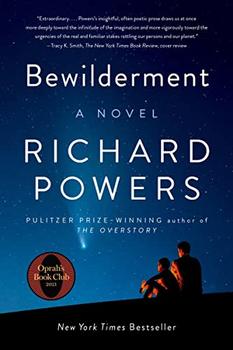Summary | Excerpt | Reading Guide | Reviews | Beyond the Book | Readalikes | Genres & Themes | Author Bio

A Novel
by Richard Powers
No way! He held up a finger. But that reminds me!
He ran inside again and returned with a compact paperback: Mammals of the Smokies.
"Really, Robbie? It's pitch-black out here."
He held up an emergency flashlight, the kind you charge by cranking. It fascinated him when we arrived that morning, and he'd demanded an explanation of how the magic worked. Now he couldn't get enough of making his own electrons.
We settled into our makeshift base camp. He seemed happy, which had been the whole point of this special trip. Lying down on beds spread out on the slats of the sagging deck, we said his mother's old secular prayer out loud together and fell asleep under our galaxy's four hundred billion stars.
I NEVER BELIEVED THE DIAGNOSES the doctors settled on my son. When a condition gets three different names over as many decades, when it requires two subcategories to account for completely contradictory symptoms, when it goes from nonexistent to the country's most commonly diagnosed childhood disorder in the course of one generation, when two different physicians want to prescribe three different medications, there's something wrong.
My Robin didn't always sleep well. He wet the bed a few times a season, and it hunched him over with shame. Noises unsettled him; he liked to turn the sound way down on the television, too low for me to hear. He hated when the cloth monkey wasn't on its perch in the laundry room above the washing machine. He poured every dollar of allowance into a trading card game—Collect them all!—but he kept the untouched cards in numeric order in plastic sleeves in a special binder.
He could smell a fart from across a crowded movie theater. He'd focus for hours on Minerals of Nevada or the Kings and Queens of England—anything in tables. He sketched constantly and well, laboring over fine details lost on me. Intricate buildings and machines for a year. Then animals and plants.
His pronouncements were off-the-wall mysteries to everyone except me. He could quote whole scenes from movies, even after a single viewing. He rehearsed memories endlessly, and every repetition of the details made him happier. When he finished a book he liked, he'd start it again immediately, from page one. He melted down and exploded over nothing. But he could just as easily be overcome by joy.
On rough nights when Robin retreated to my bed, he wanted to be on the side farthest from the endless terrors outside the window. (His mother had always wanted the safe side, too.) He day-dreamed, had trouble with deadlines, and yes, he refused to focus on things that didn't interest him. But he never fidgeted or dashed around or talked without stopping. And he could hold still for hours with things he loved. Tell me what deficit matched up with all that? What disorder explained him?
The suggestions were plentiful, including syndromes linked to the billion pounds of toxins sprayed on the country's food supply each year. His second pediatrician was keen to put Robin "on the spectrum." I wanted to tell the man that everyone alive on this fluke little planet was on the spectrum. That's what a spectrum is. I wanted to tell the man that life itself is a spectrum disorder, where each of us vibrated at some unique frequency in the continuous rainbow. Then I wanted to punch him. I suppose there's a name for that, too.
Oddly enough, there's no name in the DSM for the compulsion to diagnose people.
When his school suspended Robin for two days and put their own doctors on the case, I felt like the last reactionary throwback. What was there to explain? Synthetic clothing gave him hideous eczema. His classmates harassed him for not understanding their vicious gossip. His mother was crushed to death when he was seven. His beloved dog died of confusion a few months later. What more reason for disturbed behavior did any doctor need?
Excerpted from Bewilderment by Richard Powers. Copyright © 2021 by Richard Powers. All rights reserved. No part of this excerpt may be reproduced or reprinted without permission in writing from the publisher.
A few books well chosen, and well made use of, will be more profitable than a great confused Alexandrian library.
Click Here to find out who said this, as well as discovering other famous literary quotes!
Your guide toexceptional books
BookBrowse seeks out and recommends the best in contemporary fiction and nonfiction—books that not only engage and entertain but also deepen our understanding of ourselves and the world around us.